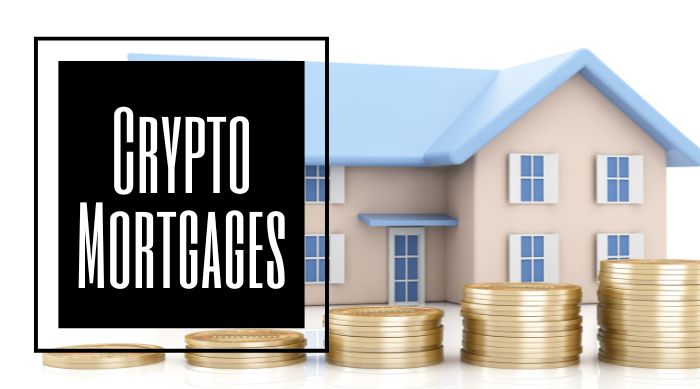Can you buy a house with crypto? Are crypto mortgages possible? Believe it or not, these are actually two separate questions. A crypto mortgage is a home loan that uses cryptocurrency as the collateral for the loan.
Buying a house with cryptocurrency outright without a mortgage may or may not be possible depending on the seller, state, and federal law (which change frequently). What this article focuses on is the ability to apply for a mortgage to buy a home where cryptocurrency is used to secure the loan.

What Is A Crypto Mortgage?
A crypto mortgage requires the use of cryptocurrency as collateral, mortgage payments, or both. Crypto mortgages are not available from traditional brick-and-mortar or online mortgage lenders the way other home loans are offered. You won’t find a crypto mortgage option with all lenders or even most lenders (at press time).
But some companies are making names for themselves on the forefront of new crypto investment opportunities. And those new opportunities bring with them some things to be mindful of.
At press time, there is still very little regulation on cryptocurrency in the United States. That means that the options for crypto mortgages may vary greatly depending on the lender. Some may require you to apply for a mortgage using cryptocurrency as collateral and you may be required to have the full value of the loan in an acceptable form of cryptocurrency in reserve to qualify.
Crypto Payments, Crypto Collateral
But you may also find lenders willing to lend in situations where both the house and cryptocurrency are used as the collateral. And while we’re contemplating the differences between crypto mortgage options, don’t forget that you may or may not have the choice to pay your monthly mortgage bill in crypto, fiat currency, or a combination of the two.
Much depends on the lender. There are no federal guidelines telling these lenders what can and cannot be done with crypto.
There ARE guidelines informing the sale of real estate, financial instruments like mortgage loans, and the transfer of property. And the lender may or may not take these into account when developing a crypto loan program. Will your loan fall afoul of existing or future U.S. law? It’s an important factor to consider.
It will be critical to learn what the rules for your specific crypto mortgage are in order to make the most informed decision possible.
Who Offers Crypto Mortgages?
A number of companies have offered or are still offering crypto mortgages. Milo Credit, BlockFi, Ledn (the name seems to be a play on the deliberate misspelling of “lend” similar to “Hodl” and “hold”) and others.
Some jumped into the crypto mortgage area a bit too early. Fortune.com reports a company called United Wholesale Mortgage announced a crypto mortgage pilot program but less than two months in, it canceled the program due to regulatory questions.
That regulatory piece is problematic, but one important development gives hope to some crypto speculators hoping to turn their virtual currency into real-world assets.
The Fannie Mae Factor
Fannie Mae is one of two government-chartered agencies responsible for ensuring a “reliable source of affordable mortgage financing across the country” according to the agency’s official site. Fannie Mae loans are conforming mortgages that meet Fannie Mae guidelines.
A lender offers a Fannie Mae loan, closes the deal, and has the option to sell that loan to the government. Fannie Mae loans, as a result, have a lower risk for the lender and may feature more flexible terms and conditions. As a federally chartered entity, Fannie Mae policies are essentially government policies.
So when Fannie Mae announced a tolerance for crypto in the mortgage process for its loans, it seemed like an indication that some kind of compromise between a lack of regulation (the current state of crypto in typical respects) and over-regulation which may be possible in the earliest days of federal scrutiny.
Fannie Mae Says “Yes” To Crypto?
At first it looked like Fannie Mae was saying NO to crypto. In 2022 the agency published guidelines that included a rule saying a mortgage lender could not use income paid in crypto to qualify for a Fannie Mae mortgage.
You cannot use virtual currency for a deposit on a sales contract (the earnest money) for a Fannie Mae loan, and there is also a prohibition on using virtual currency in the pricing of a property to be secured with a Fannie Mae loan.
Fannie Mae published more guidelines about a month later in 2022, you are permitted to convert crypto for down payments and closing costs. You cannot PAY in crypto but it is an acceptable source of funds under Fannie Mae.
The key here is that the same sourcing guidelines for fiat currency down payments are required for crypto, too. If you aren’t sure what this means, discuss your needs with a loan officer. Most traditional home loan programs require you to prove in writing that your funds did not come from unapproved sources like credit card cash advances, payday loans, etc.
Crypto Mortgages Versus Traditional Mortgages
Traditional mortgages require credit checks and down payments. The home you buy with the mortgage is considered collateral for the mortgage. Traditional loans often require mortgage insurance to protect the lender if you default on the loan.
Your home will require an appraisal, and you will be required to make some form of down payment for most conventional loans, FHA mortgages, and other options.
Some crypto loans and traditional mortgages alike offer no-money-down financing. VA and USDA mortgages allow this, and if you build a home on land you own you may have the option of using the land equity in place of a monetary down payment.
No money down financing for crypto may come with conditions. You may typically find that a crypto mortgage requires you to have the same amount of crypto as collateral as the loan amount. We’ve mentioned that earlier but it is well worth repeating for one important reason. Floor price.
Crypto Mortgage Collateral Issues To Think About
A mortgage loan that lets you use crypto as collateral sounds like a great deal. And it may well be. But that great deal is only working in your favor as long as the value of your coins does not fall significantly and for a prolonged period of time.
Any loan tied to a currency with unstable value is a risky proposition. Remember, you are buying a home with a value that, while subject to change, is NOT subject to the rapid ups and downs of virtual currency. A new appraisal or assessment might change the value of your property, but a random Tweet by Elon Musk will not.
But if that random Tweet changes the dollar value of your crypto and is not in your favor? You may have some financial damage control to think about associated with your mortgage.
Could you find yourself with a mortgage loan that is secured with funds that suddenly require a whole lot MORE to meet your obligation for the collateral? Could you lose your home if the value of your crypto falls below a certain threshold?
There are other issues. If you are allowed to make your mortgage payments using crypto, what are the rules for falling values? Do you know when your payment is reduced in value and how you may be required to make up the difference if that happens?
You may need to design strategies for handling the ups and downs of your currency and add a contingency to make sure the correct dollar value is paid on the loan regardless of the floor price of your coins.
These are questions you need to ask before committing to a loan where the value of your money could change overnight.
Joe Wallace has covered real estate and financial topics, including crypto and NFTs since 1995. His work has appeared on Veteran.com, The Pentagon Channel, ABC and many print and online publications. Joe is a 13-year veteran of the United States Air Force and a former reporter for Air Force Television News.


